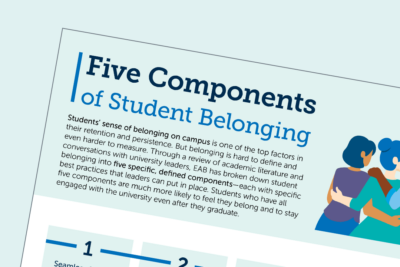Prime First-Year Students for Success with Resilience and Coping Skills
This report is now free to access as part of EAB’s work to help education leaders and employers tackle student readiness challenges.
The first year of college can be full of difficult transitions: moving to campus, establishing a new routine, and adjusting to new expectations. Given all these changes, it’s no surprise that many first-year students struggle. These challenges often lead to students feeling stressed or overwhelmed, which can quickly escalate to more significant mental health and well-being concerns.
Students’ resilience and coping skills influence their behaviors when responding to setbacks and impact the outcomes of challenging scenarios. Generally, students with low resilience and coping skills withdraw and see their concerns intensify, while students with high resilience and coping skills seek help from peers or campus resources and persevere through challenges.
Most colleges and universities have several touchpoints built into the first year that they can easily enhance with resilience and coping skills, including orientation, common reading programs, and first-year experience courses. This paper outlines three recommendations for engaging first-year students in developing these essential skills.
Recommendation 1: Introduce resilience before students arrive on campus
Pre-semester exercises provide an opportunity to prepare students to encounter setbacks and introduce them to strategies or ways of thinking that will help them overcome challenges. At the University of Texas at Austin, psychological researcher David Yeager partnered with chemistry professor David Laude to introduce a an exercise students complete before arriving on campus to prime them with growth mindset concepts.
Recommendation 2: Extend the conversation throughout the first year
EAB recommends institutions extend conversations about resilience and coping skills beyond orientation to help students learn the content and skills they need to succeed on campus. See how Susquehanna University used input from faculty, students, and staff, to develop a reading list, curriculum, and series of events connected to resilience.
Recommendation 3: Implement a multi-pronged approach
Helping students build strong resilience and coping skills requires sustained attention and a mix of ongoing interventions. California State University Long Beach’s College of Natural Sciences and Mathematics recognized how students were struggling to cope with the rigorous academics and competitive cultures of their programs.
More Resources

Student Experience and Well-being Resource Center

5 components of student belonging
